Interview with Diane Kruger of “The Bridge” new TV series on FX
Diane Kruger talks about her new series The Bridge, which is based on the Danish/Swedish television series of the same name. (Be aware that there are SPOILERS BELOW in regards to Diane Kruger’s character and some general information about the series.)
Both shows launch with the same brilliant high concept — a body is found cleaved in half, one half placed on one side of the border and one on the other — this forces police from opposite sides to team up to solve the murder. In the original, it was the border between Denmark and Sweden. In the new American series, it is the border between El Paso, Texas and Juarez, Mexico, and Diane Kruger’s counterpart is played by Oscar-nominee Demián Bichir.
The new version adds a heavy character dynamic to the female detective, and I can say that it’s quite compelling to watch. Diane Kruger’s DETECTIVE SONYA NORTH is the most fascinating character I’ve seen on television in a long time. As she says below, they make the bold choice not to define why her character acts as she does until after the initial three episodes, so if you want to go in fresh, skip the interview.
The Bridge will debut on the FX network on Wednesday, July 10th 2013 at 10:00 p.m. Eastern/Pacific.
There are several shows on TV right now, The Following, The Killing, Hannibal that all deal with serial killers. Can you weigh in on what you think will make The Bridge stand out and what’s unique about it than the other shows?
Diane Kruger (D.K.): Well, to me, first of all the setting between Mexico and America is unique and I don’t think has been done on television before. And I think the backdrop of the unsolved crimes as the missing girls from Juarez, the relationship between America and Mexico is very interesting to see and shine a light on. I think that the two characters, Demian Bichir’s MARCO RUIZ and my SONYA CROSS, are an unusual combination of detectives. The show’s not your usual cop show. It’s a very character driven show, and you think the show’s about one thing and then it goes in directions that will be quite unexpected.
There are some very topical and perhaps controversial issues that are laid out in this show, because it is the Mexico/U.S. border, involving immigration, police corruption, drug and gang wars in Mexico, etc. Do you like it when you can layer that extra element of topical material into what you’re doing, that the storytelling gets to inform in this way in addition to entertaining?
D.K.: I’m not sure if it’s necessarily to inform the public of something. I think it’s more shining a light on a situation that most people I think in the U.S., and Mexico, I’m assuming, are aware of. I personally don’t like shows that try to, or movies as a matter of fact, that try to, like you said, teach you a lesson or tell you this is the way it is and we should all be doing something differently, because at the end of the day that’s not our job. The show has to be entertaining, but what we’re trying to do is shine a light on a situation and be as accurate and be as not partial to either side. And so to me that’s what is different, and it’s never really been done, in my recollection, either on television or in films, the movies, because we don’t have all the answers. Obviously I don’t have the … to really know how we can stop the drug cartels or how we can find the murderer of the missing girls of Juarez, but we can show them what is going on, we can show and look and hopefully, shine a little light on the situation. That’s really what I thought was interesting.
Do you feel that the relationship between Sonya and Marco is a metaphor for that whole Mexican-American relationship and how it could be?
D.K.: Yes, a little bit, obviously just on the surface, because our characters are not trying to make a political statement. But it is pretty obvious how different our ways of operating are on the show and how we look at the world quite differently. And I think it is a little bit of a metaphor of how we’re trying to solve crimes, shine a light on those horrible situations that present themselves. And we’ll see what happens, we’ll see how the season evolves and maybe the second season, what direction it will go.
Did you feel any pressure giving your own spin to a Scandinavian series and characters people already were familiar with, and did you encounter any unexpected things for the role?
D.K.: No, actually it was very exciting to see the original show. I actually watched most of it and [watching] my character was kind of the defining moment for me to take the show. It’s a very different culture, Denmark and Sweden obviously, but I’m European myself so that sensibility hits more close to home. I loved the show. I was completely hooked. It was a huge success in Europe, so I found myself actually excited because obviously we adapted the show and there was a lot more, especially for my character, than was in the original. So I felt like there was enough room for me to make it my own and to give it my spin, so that was the exciting part.
We’re just finishing episode nine right now, and there have been scenes that have been very challenging for me in terms of performance. It’s a lot. The Asperger’s is something that has taken up a lot of my time and a lot of my space and there are days when it’s easier to get my head around it and just forget about my normal, natural instincts than others, and there have been some really emotional scenes, very difficult emotional scenes that have to do with my back story. So it’s definitely still a challenge.
How different you think the tone of this series is versus the original?
D.K.: The tone is actually pretty similar. I think that we follow the skeleton of the original show faithfully. It’s the same sort of intrigue and plot. Obviously just the colors of the show in terms of lighting are very different, because we’re setting it in El Paso and Juarez, so it’s much warmer and lighter and brighter and sunnier. But the characters are pretty much the same, and then obviously storylines will evolve a little bit because of that, and the major, major difference being that we get to see ‘Sonya’ in her personal life much more than in the original show.
With this kind of script, is there room for any kind of improvising or changing around the lines, or is it pretty set in stone?
D.K.: No, we change, not a lot, but there are definitely gaps to be filled in, and FX being FX , a very actor friendly network and being very character driven, we always do table reads, the writers invite all of us actors to give comments on the script. And it doesn’t always make a huge difference, but they have been very open to our suggestions, and a lot of the scenes are being changed …, and that’s really important because sometimes you can write a great scene but when you’re actually in a situation and it doesn’t work, you have to be flexible enough to make it work for you.
THE NEW “GOLDEN ERA” OF TELEVISION
You have a very long, extensive movie career and I was curious as to what led you to television?
D.K.: I think the networks on cable television right now are in the Golden Era and I find myself watching shows like House of Cards and Mad Men and Breaking Bad, and feeling like they’re better than most movies that I watch these days, and they’re really great dramas and the quality of the writing surpasses so many movies. I [also] love The Americans — I’m not quite caught up, I have three more to go, but that is my favorite new show.
I just am very excited to be a part of The Bridge. The writing is superb. A character like this has never been offered to me in the movies, and the opportunity to get 13 episodes to explore that person is exciting, and I feel like it is a really exciting time for directors and actors to come to cable television, so that’s really what led me to it.
For those of us writing pilots of our own, we’d all love to know what stands out in a pilot script to attract a movie star like you? You talked about transitioning from film to TV, so what specifically jumps out at you, what does it need to have for you to feel like this script is A-list material?
D.K.: For me it was a little bit of mystery. I didn’t immediately understand Sonya’s character. It wasn’t quite on the page. So I was intrigued enough to take the meeting with the writer to get a sense of who she was and what her story was going to be. I personally find that, my partner is an actor [Joshua Jackson of Fringe and Dawson’s Creek] and he was on network television and a lot of the things that I learned from him is that coming from movies I really like to know, at least in broad terms, where my character is going throughout the season, what the broad aspects of her character are so I can prepare. Because in movies you know the beginning, middle, and end, and so you can tune your performance to what will happen next, or what is to come and how it might end, and you know the whole picture. And I would not like not knowing at all, to be sort of totally surprised every week, “Oh, and this is what this character’s doing now.” I need to define my character from the beginning so that I can stick through that throughout the season. That’s something that I looked for and that I got from my writers. And the willingness from my writers, feeling like they will help me create this character, I can fall back on them, because in television you have a different director every week and they aren’t necessarily as invested or know my character as well as those writers, so I want to feel that teamwork.
Roles for women on cable television have frequently been limited to the wives of the men who are the main characters. Do you see opportunities for women broadening in cable television with roles like this one, and do you think that cable does better with women than the movies does?
D.K.: Oh yes, I absolutely agree with that. There will continue to be movies that have great female roles, but I definitely think that on cable television, from Mad Men to Homeland or Robin Wright in House of Cards, those female parts are so well written and unafraid of characters, and that’s really what it comes down to, I think. It seems to me that they thrive and the audience is looking for characters like that, and it’s very exciting for women, I think in general, definitely. Like I said, I’ve never been offered an in-depth character like this in a movie.
A CHALLENGING CHARACTER
The character of Sonya Cross is completely different than anyone we’ve ever seen in a police drama for that type of show. With some of her social awkwardness and things that come from the Asperger’s, a lot of that is played for comedic effect and in certain situations where it’s very awkwardly funny, do you worry at all that some viewers may be offended by the choice to play the character in that way, or do you think that the show handles it pretty well?
D.K.: Obviously you always want to make sure that people that are concerned with that condition feel that they are being represented accurately. I feel very grateful that we were able to get the support from Autism Speaks, which is the biggest association for people with autism. They’ve come on board to be a partner on the show, and like … we have a young man called Alex Plank who has Asperger’s who’s been my partner on the show who’s on the set every day when I work, and he’s going into the writers’ room and he makes sure that not only do I have the support that I need, but he helps me immensely. And I think he would be the first person to say that he finds himself sometimes in funny situations because of his condition. And I think that’s really lovable. And I’m extremely fond of Sonya. I’ve come to understand where she goes … she doesn’t understand a situation and if that’s funny sometimes then that’s great because you also see very … when her condition leads her down a path that is not funny. I feel like we’re hopefully pretty much on the right track here.
Did you do a lot of research for that aspect of it, or did you find that the scripts pretty much covered everything you needed to know?
D.K.: Yes, I did a lot of research. We actually shot a couple of days in El Paso for the pilot, so I did get to walk the bridge of the Americas and spent the day in Juarez, because I just needed to see for myself. And I don’t have the pretension to know everything about the conflicts that are going on, but certainly I’ve been in the U.S. on and off for the past 20 years and I read the New York Times every morning, so you feel like you practically have to be blind and deaf to not hear about those issues and hear about immigration and so forth. I’m intrigued by that aspect of the show, for sure. I want to know more. I want to understand more. And I find it fascinating, and quite risky, actually, on FX’s part to try and shine a light on that situation.
Your character and Demian Bichir’s character make quite an interesting and unique detective team — you’re so brittle and socially awkward and he’s so warm, a people person, and that was all laid out for you in the script, right? Did you all have to fine-tune it, or work at it, and how do you all get along when the camera stops?
D.K.: The relationship between those two detectives was laid out for us, which is also what to me was interesting about it is that we have two opposite cultures and in a way I think Demian represents very much how we imagine Mexican men to be, very Latin and charming and he has a great accent. And then Sonya is very much, in a way, America because she’s very … the rules and is very much all about business and enforcing the law, so that was in the show. What we are trying to convey, as the show unfolds over the 13 episodes we’re trying to show two such different cultures, two such different countries, and how they can put their differences aside for the greater good and try to make their relationship work and how they can take away things from one another, so that’s what we’re working on every day, in every episode we’re trying to adapt the characters to that.
When the cameras are not rolling, Demian and I have actually become really friendly and really good friends. We were supposed to make a movie together before the show came along, so it felt like we were meant to work together, and I admire him very much as not just a colleague but also as a person, I think he’s wonderful, and so his significant other and mine have sort of formed a real friendship.
I wanted to maybe have you explore a little bit about the warmth that is a very subtle thing that we see you have with Hank and how it’s like a minor thing that we get to kind of see as you interact with him, but then when you work with Marco you have that defense system up. How much do you play on those little subtleties of showing that warmth between those two characters?
D.K.: Like I said, the challenge of the part is that Asperger’s is very subtle in a way. When you meet someone, especially a person who’s functioning, who’s learned to adapt to some of the social cues and who is in a work field, some of the symptoms that you would pick up on might be misunderstood. You could think that they’re blunt, or they’re geeky, or they’re weird people, or they’re annoying, so it is very important that you see other aspects to her, because people who are affected by Asperger’s of course have feelings and of course they do have empathy, and of course they are a regular human being like you and I.
So we’re forever trying to challenge her, forever trying to find moments where we see Sonya’s realization that … or that she made a comment that was interpreted in a different way than she intended it to be. And she is someone who’s trying to learn and to adapt, and that is the beautiful cover of Sonya and that continues to be a struggle. But one thing I’m not worried about is that the audience will not come to love her, because just as I have, the more you watch, the more you will see the pieces of the puzzle fit together, and she’s a wonderful, wonderful character to play and I really have been rarely so fond of a character than her. So hopefully everybody who watches the show will come to see that.
You did a lot of research for the role to perfect your character’s condition — since the show started do you find that your own instincts and ideas ever intrude on the project and what’s written in the script?
D.K.: Yes, I mean, all the time. Like I said, when I first started reading the books about Asperger’s or autism in general it kind of … [dawned] on me that this was going to be a much bigger undertaking than what I thought it would be. It continues to be, like I said, a huge challenge because my instincts tell me to say things with intention sometimes, which is totally wrong for this character because she doesn’t mean to be rude, she doesn’t mean to be blunt. It’s really trying to put my mind to see things from a totally different perspective that a person with Asperger’s would do, and that is obviously difficult. They’re very rational and logical and they take shortcuts. The social niceties or the social cues that we all have to learn to read just don’t exist for them.
So sometimes, to be honest, it’s a great relief because you just say it how it is. And then other times, especially when you’re in a scene where a person is really hurt or is emotionally distraught and you just can’t show any empathy — that goes against any person’s instincts, and so it definitely keeps me on my toes.
You’ve sort of got a double role to play here, and that’s both a person with Asperger’s and a cop. What was the hardest thing for you to perform when putting those two roles together?
D.K.: Well, it’s just that how can someone who has a condition such as Asperger’s really excel at being such a good cop? And that’s really what drew me initially also to the project, because, yes, she has this condition, there are so many shortcomings in her personal life that appear because of that condition, yet she is so different in her job because she has this ability to focus and to really look at things from a different point of view, and that was really interesting to me. I had never really had a desire to play a cop, I’m not really the gun toting kind of person, so that’s what really was interesting to me. And in the original Scandinavian show that we are adapting, that was really the thing that drew me to it, Sonya’s character is just so different and cool and a real challenge, because Asperger’s is much more subtle than a more severe version or case of autism.
What was the hardest thing to master about playing a person with Asperger’s? You mentioned that it’s a very subtle thing, what was the most difficult aspect of that?
D.K.: Everything about Asperger’s was very new to me. I’ve heard of autism, but I wasn’t familiar with Asperger’s. As soon as I started reading up on it, I realized that this is a really daunting undertaking and continues to be so, because it’s not something that you can just put on. It’s a mind frame that I have to put myself into every day. There’s not one single line in the dialogue that’s ever been a straight up line.
And so the key for me really happened when FX decided to reach out to Autism Speaks, which is the biggest association, not just for Asperger’s but for autism obviously in the U.S. They introduced me to a young man called Alex who has Asperger’s himself and FX decided to bring him on as an advisor to the show. So he’s on the set every day when I work, and I’ve spent, I’m not kidding, more time with him in the past four months than I have with my partner … because I have so many questions and I’m just observing him, but I’m also asking him some pretty uncomfortable questions. And his willingness to be my partner in this has made a big difference. I sleep easier at night knowing that he watches over everything I do.
Because of Sonya’s Asperger’s she doesn’t necessarily understand why people react in a certain way, but what do you think would have to happen to make her really tick?
D.K.: Well, many things make her tick, and that’s one of the major challenges for people who are affected by Asperger’s. They get overwhelmed easily in a situation that they are not used to, which could be just an unforeseen situation, and something that they can’t control. Some of the things that go through someone’s head who has Asperger’s is they project themselves into every possible scenario when they are, for example, with, let’s say, she would need to go interview, like the scene with the judge’s husband, so clearly she’s very uncomfortable with people one-on-one that she doesn’t know and that are emotional, she doesn’t know how to handle emotions, so she has probably been in a situation like this before so she will try to go through the protocol that she has learned, worked well in a situation where someone told her it is the custom to do so.
But if a person reacts differently than she expects, she very often can get overwhelmed, and there are calming mechanisms that people with Asperger’s do, like certain materials that they would rub over and over, certain pics, heavy breathing, trying to stay in check. But you will see her in the show get overwhelmed by a situation and you will see her come undone.
How do you pull away the emotion, because for an actress emotion is the calling card that you bring to any kind of a production, but how do you take that away?
D.K.: It has not been easy, and it continues to be – it’s not like she doesn’t have any emotion, like I mentioned before, it’s just that it’s in the oddest places. It goes against my instincts every single day. So doing this back story has been my saving grace because there’s that one place that you come to learn when you watch the show where she puts all those bottled up emotions. And then also Ted Levine’s character, ‘Hank,’ he’s sort of her … I’d say, he’s the only one that gets to see the more emotional side. But it’s a daunting character to take on, and you have to accept that people might be put off at first when they first meet her.
LOOKING AHEAD
Is there a particular part or scene that you’re looking forward to people seeing specifically?
D.K.: Well, I think what I’m looking forward to is that we decided early on that we were not going to label Sonya’s condition in the show, which I think is very important and very interesting, because we didn’t want her condition to be her defining character trait. So I thought that was really brave and it’s pretty ballsy, in my eyes, because in the first episode, I don’t know if you’ve seen all three, but she’s so odd and you don’t really know what it is that’s off. And I think it will be great to get the opportunity for the next 13 episodes to see her nuance and her layers and to understand a lot of her back story that has made her the person that she is today.
Where we go away from the original show is that the writers agreed to write a back story to her character, which we will come to explore as the show goes on, and it will really show you a very emotional side of Sonya, which I’m always very excited to play because she so often could come across being blunt or standoffish, which is not at all the case, because people with Asperger’s have empathy and they have feelings, of course, but they just don’t know when to show those emotions. There’s a delay there. And they understand when somebody is pissed off or their behavior causes people to misread their intentions, but they just don’t understand what it is they said that … those feelings off, so there’s always this delay.
And so there’s a lot of darkness and loneliness that ‘Sonya’ carries around and probably has carried around for most of her life, and yet she’s so great at her job. And so there will be a lot of emotional moments for her, some funny moments because obviously Asperger’s leads sometimes to comedic moments, like I don’t know if you’ve seen episode two, but the way that I go to pick up a guy in a bar is pretty priceless, in my opinion.
Will we see more of the supporting characters, like Ted Levine’s character Hank and Marco’s wife?
D.K.: I don’t want to give away too much. But I think definitely Lieutenant Hank is a character that knows Sonya better than most. He’s sort of a father figure for her, and you will come to find out why in the show, with a private back story that we’ll come to explore through his character. And with Marco’s wife, I don’t want to give away too much. Nothing that is relevant to the plot on a bigger scale, but we will definitely see that relationship explored a little bit.
HUMBLE BEGINNINGS
Did you always want to work in this industry while you were growing up, or did you have other professions in mind?
D.K.: No, I didn’t dare dream of anything like this. I come from a very small rural village in northern Germany, and being an actor never even seemed a possibility. I thought you would have to live in a big city or been discovered somewhere or being born into an artistic family, which I certainly wasn’t. I dreamt of becoming a ballet dancer. I studied with the Royal Academy of London for 11 years and that did not pan out, my love for being on stage was born there, and then I actually went to drama school in Paris, France. So that’s where it first started. I never thought I would have an opportunity in the United States to act and continue to expand my career outside of Europe. So my reality is, to be honest, it’s bigger than I would have ever dared to dream.
What’s your favorite show on TV right now, your favorite song on the radio, and the best movie you’ve seen recently?
D.K.: My favorite show would be House of Cards for the intrigue. I find myself fascinated by looking behind curtains in Washington, and I’m a huge fan of Robin Wright and I think she is absolutely amazing on that show.
My favorite song on the radio, gosh … I love that song “Radioactive.” I don’t know who sings it [Ed: Imagine Dragons], but I love that. I don’t know why. It was in one of the movies I did, so I guess it’s been stuck in my head.
And my favorite movie that I’ve seen recently, I don’t know. I just saw Man of Steel and I thought that was pretty cool. I liked it. Yes, he’s a good new Superman.
One last question. Do you solve all of this in the 13 episodes of season one?
D.K.: Yes, we are going to solve this crime.
Good Luck and Happy Writing,
Dan Calvisi
Related: My Lady Cop Can Beat Up Your Man Cop (The Bridge, The Closer, Law & Order: SVU)
Related: Writing a TV Pilot
Related: More on TV Writing
 “Dan has a no-nonsense approach to screenplay analysis that cuts through the bull and delivers the goods. A must read for serious screenwriters.”
“Dan has a no-nonsense approach to screenplay analysis that cuts through the bull and delivers the goods. A must read for serious screenwriters.”
-J. Stephen Maunder, Writer/Director

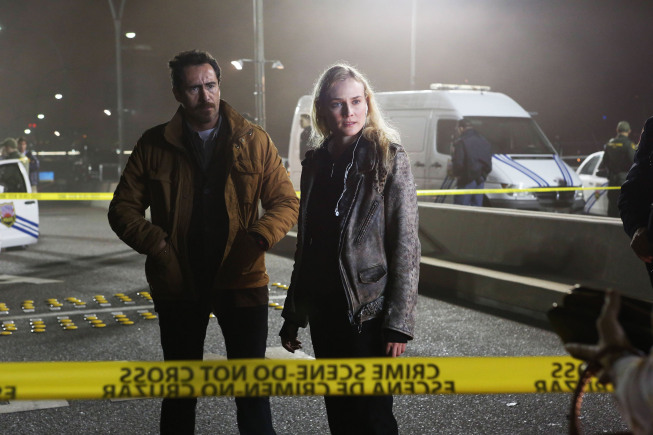
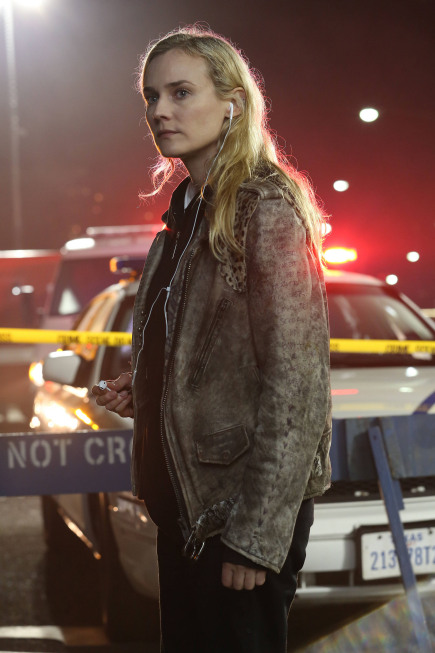
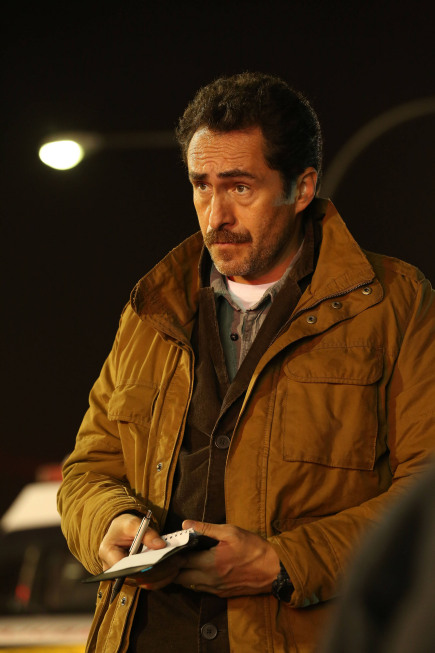

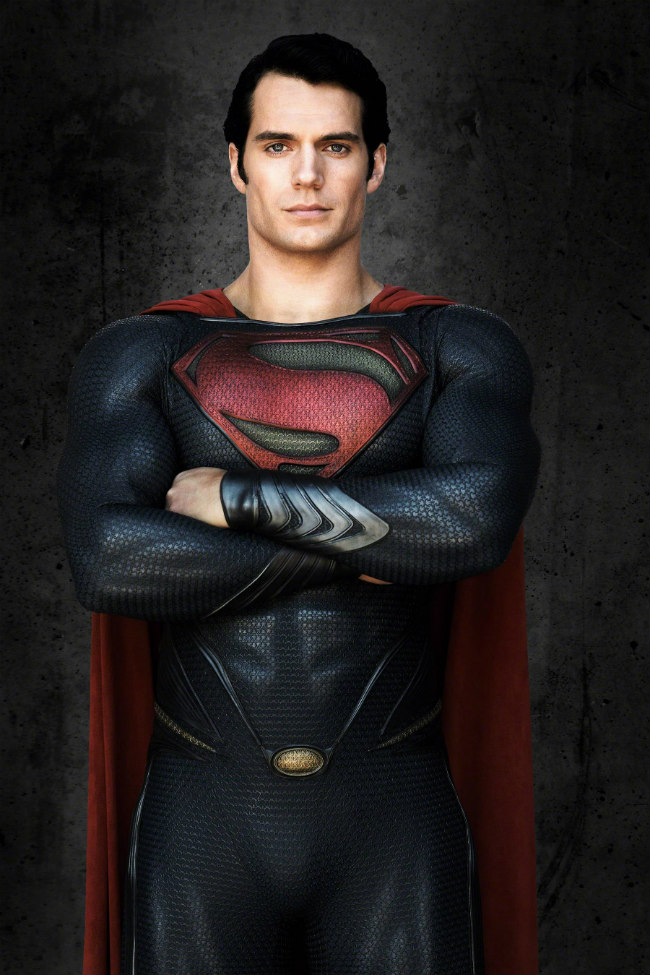
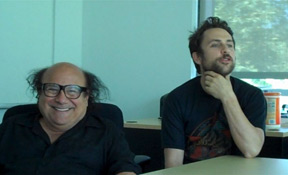
Leave a Reply
Want to join the discussion?Feel free to contribute!